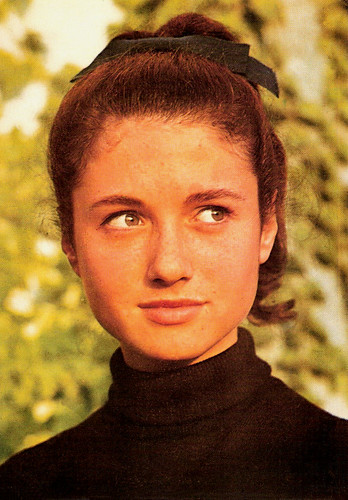
French postcard by E.D.U.G., no. 399. Photo: G. Neucevelle.
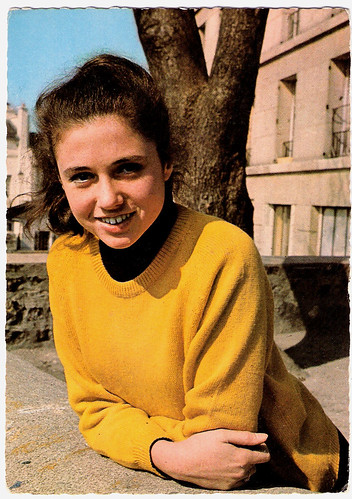
French postcard by E.D.U.G., no. 398. Photo: G. Neucevelle / Disques Festival.
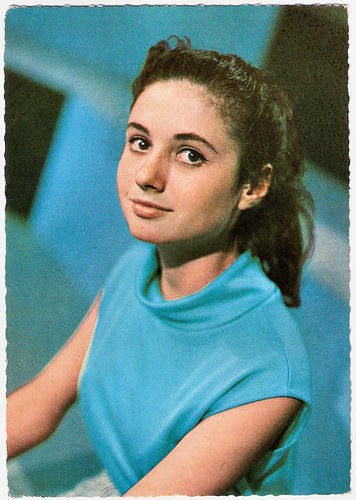
French postcard by PSG, no. 1029. Photo: Gérard Neuvecelle.
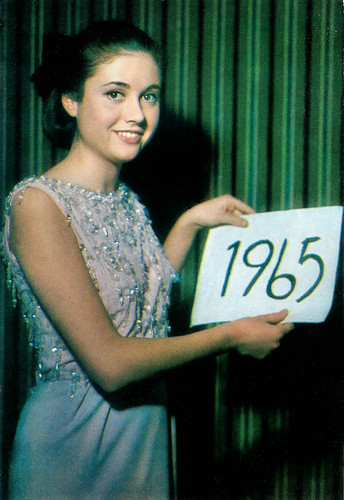
Spanish postcard by Postal Oscarcolor, no. 285.
First ever victory
Gigliola Cinquetti was born in Verona, Italy in 1947. In the autumn of 1963, she appeared at the Festival di Castrocaro and won with the song 'Le strade di notte' (The Streets of the Night). In 1964, she won the Festival di Sanremo singing 'Non ho l'età' (I'm Not Old Enough), with music composed by Nicola Salerno and lyrics by Mario Panzeri.
Her victory enabled her to represent Italy in the Eurovision Song Contest 1964 with the same song, and she went on to claim her country's first-ever victory in the event. Her song became an international success, even entering the UK Singles Chart, traditionally unusual for Italian material. Non ho l'età sold over three million copies, and was awarded a platinum disc in August 1964.
That year she also appeared in the film comedy Canzoni bulli e pupe/Lyrics, Guys and Dolls (Carlo Infascelli, 1964) with the comedians Franco Franchi and Ciccio Ingrassia playing an adman and a mad scientist who have found a way to interfere with TV broadcasts in order to promote a plumcake. The following year she appeared in another musicarello (Italian musical with a lot of contemporary hit songs), Questi pazzi, pazzi italiani/These crazy, crazy Italians (Tullio Piacentini, 1965) also with Petula Clark.
In 1966, she recorded 'Dio, come ti amo' (God, How I Love You), which became another worldwide hit. She also continued to appear in the cinema. She played a small part in the family comedy Testa di rapa/Blockhead (Giancarlo Zagni, 1966) featuring Folco Lulli, and she had the lead in the romantic drama Dio, come ti amo!/How Do I Love You? (Miguel Iglesias, 1966), an Italian-Spanish coproduction co-starring Mark Damon.
On TV she appeared in such musical comedies as Addio giovinezza!/Goodbye Youth! (Antonello Falqui, 1968) with Nino Castelnuovo. In the cinema she starred with Little Tony in Il professor Matusa e i suoi Hippies/Professor Matusa and his Hippies (Luigi de Maria, 1968). Among her hit songs from these years are 'Piccola Cittá' (1967), 'La Pioggia' (1969), 'Amarti e Poi Morire', 'Le Bateau Mouche' (1971), and 'Je Suis Timide' (1972).
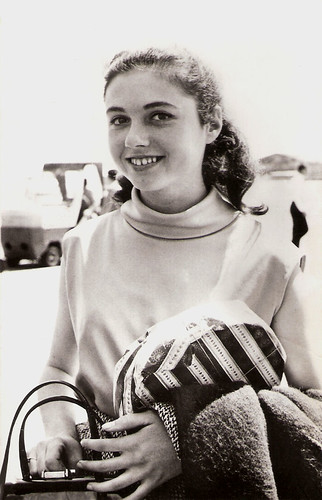
Dutch postcard by Gebr. Spanjersberg N.V., Rotterdam, no. 1212.
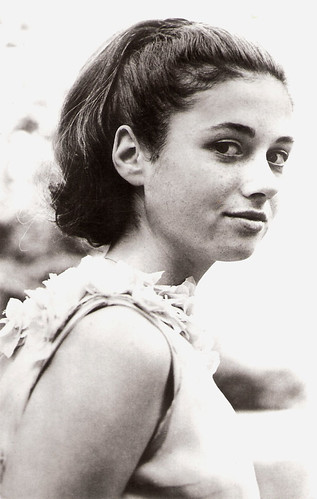
Dutch postcard by Gebr. Spanjersberg N.V., Rotterdam, no. 1200.
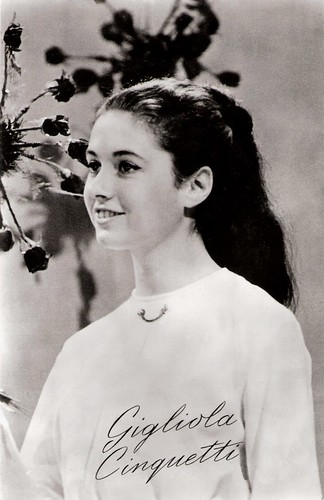
Dutch postcard by Takken, Utrecht, no. AX 5908.
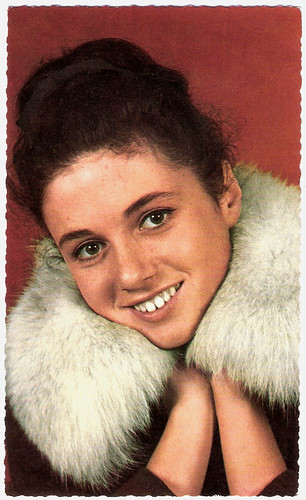
French postcard by Publistar, Marseille, no. 1030. Photo: Giancolombo / Disques Festival.
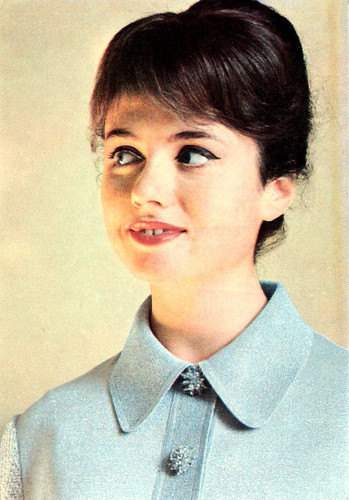
Italian postcard by CGD.
Political firestorm
Gigliola Cinquetti returned to the Eurovision Song Contest in 1974. She performed the song 'Sì' (Yes), again representing Italy. She finished second behind Waterloo, sung by Sweden's ABBA. At All Music, Dave Thompson writes that she ran into a political firestorm in her homeland: “Italy was about to go to the polls for a referendum on the legalization of divorce. It was feared that the song's title, translating as Yes, would be construed as a commentary upon the debate and might even act as a subliminal message to voters.”
The live telecast of her song was even banned in her home country by Italy’s national broadcaster RAI. The song remained censored on most Italian state TV and radio stations for over a month. An English language version of the song, 'Go' (Before You Break My Heart), reached number 8 on the UK Singles Chart in June 1974.
One of her other songs, 'Alle Porte del Sole' (1973), was re-recorded in English as 'Door of the Sun' and Italian by Al Martino, two years after its initial release. It reached #17 on Billboard's Hot 100 in the United States. Cinquetti's own English version of the song was released as a single by CBS Records in August 1974, with her original 1973 Italian version on the B-side. Cinquetti went on to co-host the Eurovision Song Contest 1991 with Toto Cutugno, who had brought the event to Italy with his victory in Zagreb the previous year - the country's first win in the contest since her own twenty-six years earlier. During her career, she had more than 10 Top 20 hits in Italy.
In the 1990s she became a professional journalist and TV presenter. She is a supporter of the centre-left Italian Democratic Party (PD) led by Walter Veltroni. In 1999 she played a small role in the Italian sitcom Commesse/Shopgirls (Giorgio Capitani, 1999). Her last film role was a small part as a mother superior in the adventure film I cavalieri che fecero l'impresa/The Knights Who Made the Enterprise (Pupi Avati, 2001) starring Raoul Bova, Edward Furlong and Thomas Kretschman.
From 1979 on, Gigliola Cinquetti was married to Luciano Teodori and they have two sons: Giovanni and Costantino. Nowadays, she hosts the current affairs programme Italia Rai on RAI International and remains a well-known and much-loved public figure in Italy.
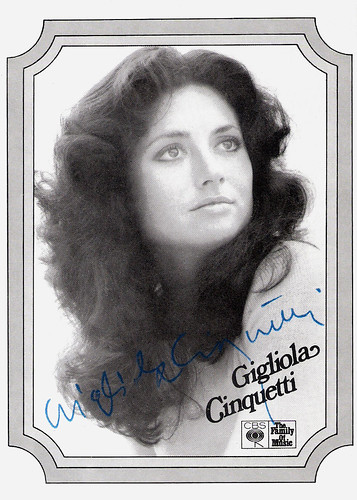
German autograph card by CBS.

Italian postcard by E.N.P., Roma. Art work by F. Picchioni.
Gigliola Cinquetti sings 'Non ho l'età' at the Eurovision Song Contest 1964. Source: 1947dave (YouTube).
Gigliola Cinquetti sings 'Anema e Core' in the film Dio, come ti amo!/How Do I Love You? (1966). Source: Odaizon (YouTube).
Sources: Dave Thompson (AllMusic), Wikipedia and IMDb.
This post was last updated on 27 September 2023.
No comments:
Post a Comment